With the rapid advancement of networking technology, the nodes of the network are no longer just desktop computers or mobile devices at home. Every machine and every object we come into contact with may become “conscious” in the future. Our lives will become more interconnected through various smart devices, ushering in a new era of the Internet of Things. Within this concept, the hidden Industrial PC (Industrial PC) is a crucial driver for the tangible implementation of the future IoT in our lives. So, what is an Industrial PC?
An Industrial PC can be simply understood as the controller within industrial automation machines. Aside from mechanical components, the most critical component that allows a machine to have “automation” capability—from data and signal input to the operation of the entire machine—is the controller. In fact, automation is the process where machine components automatically execute a “program”. Each instruction in the program is analyzed and issued by the controller to achieve the goal of automatic operation of various parts of the machine.
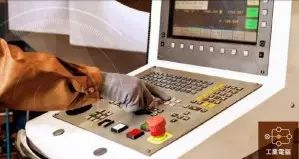
Differences Between Industrial PCs and Personal Computers
When it comes to Industrial PCs, the first question most people ask is: How is it different from the computers we use daily? In fact, if we trace back to the origins of computers, there was no such classification as we have today. During World War II, computers emerged as “super calculators” to handle the military’s vast and complex calculations. After the war, originally military computers transitioned to civilian use, gradually developing various applications through countless evolutions, leading to the emergence of personal computers (PCs) that combine multiple functions. In recent decades, as technology has developed rapidly, personal computers have become increasingly powerful and widespread. Smart humans began to think about applying PCs to upgrade automation devices. However, original PCs, while high-performing, were not stable enough to meet the strict requirements of industrial processes and environments, leading to the birth of industrial computers suitable for different professional fields.
Personal Computers focus on providing diverse needs; they can be used for writing reports, watching videos, playing online games, and handling various tasks. Industrial PCs, used in industrial processes, do not require as many functions but emphasize meeting specific needs. They must maintain consistent performance in certain environments for extended periods and cannot experience frequent minor issues like personal computers, or else they could incur significant losses. Additionally, industrial computers are core devices in systems that need to work in conjunction with other peripherals, unlike PCs, which are presented as final products. Without high compatibility and expandability to add equipment, they are not easily adopted by customers.
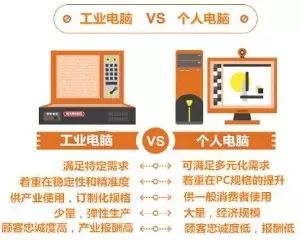
Because the needs of different industries vary, industrial computers in high-temperature environments may need better heat dissipation capabilities, while some industries may have higher dust-proof requirements. For instance, the ATM systems used in the financial industry particularly emphasize meeting security protection needs, requiring more effort to develop this characteristic. The value of industrial computers lies in their ability to provide customized system integration tailored to different customers’ needs, making small-batch and diverse supply a significant feature of the industrial computer industry. Given that the expected lifespan of industrial computers is 5-7 years, their product cycle is longer than that of personal computers. Therefore, the selection criteria for purchasing industrial computers do not focus on functionality, appearance, or price like personal computers, but rather on the brand’s technical advantages and after-sales service.
Types of Industrial Computers
Due to the fact that industrial computers are almost exclusively designed for specific needs, they come in various forms. To simplify classification, industrial computers can be categorized by type and level. Generally, there are three types: Boards, Subsystems, and System Integration Solutions:
Boards: These include Single Board Computers (SBC), Embedded Boards, and PC/104 modules. Simply put, boards are lightweight components that provide the host function of a computer in a compact form. A single board computer is a mainboard card with a bus that possesses all the functionalities of a computer, which can be paired with software for various industrial applications. Embedded computers are designed to be integrated into application machines, miniaturizing single board computers. The PC/104 module acts like an expansion card for personal computers, enhancing the functionalities of single board or embedded computers.
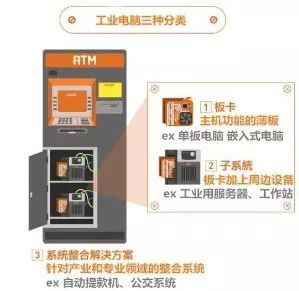
Subsystems: These combine components such as single board computers, baseboards, enclosures, and power supplies into a functional system. Once connected to a larger system, they can be used, for example, as industrial servers or workstations.
System Integration Solutions: These are complete systems developed for specific industries or professional fields, including software, hardware, and peripherals. Typically, they involve highly customized outputs to meet different industry needs, with system integration development manufacturers in various fields enjoying high customer loyalty due to the technical barriers to entry. Relevant products include: Automated Teller Machines (ATMs) and metro systems.
Supply Chain of Industrial Computers
Although industrial computers and personal computers have significant differences in functionality, demand, and appearance, their basic components are quite similar, including CPUs (central processing units), chipsets, connectors, circuit boards, power supplies, enclosures, and other electronic components. Generally, suppliers have considerable overlap, with many component manufacturers supplying both personal computer manufacturers and industrial computer manufacturers. However, due to differences in shipment volumes and production timelines, some component manufacturers may establish separate departments specifically for producing industrial computer parts. After upstream component manufacturers sell parts to midstream industrial computer manufacturers, the manufacturers will assemble various types of industrial computers based on their types, at which point the core of the industrial computer is generally formed.
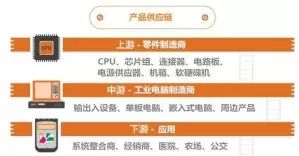
For industrial computers to reach the market, the most critical role is the system integrator. The assembled industrial computer serves as a basic configuration that needs to undergo customized system integration by system integrators for different professional fields, combining with peripherals to provide a functional product for end customers. Additionally, to meet various additional functionality requirements, value-added resellers may enhance industrial computers with extra software and hardware features (such as antivirus software for operating systems) before selling them to system integrators.
Where Can They Be Used?
Industrial computers were initially designed to upgrade industrial production to automated production lines, so their primary application area remains the automation industry. However, as the demand for automation in various industries has increased, more and more places require industrial computers to help form a complete control system. Therefore, their applications can be seen everywhere, including automated production lines in industrial processes, as well as in retail, healthcare, and transportation, where industrial computers can be found in applications closely related to our daily lives, such as convenience store cash register systems, automated storage devices, and metro automation systems. Essentially, wherever automation devices are applied, there will be industrial computers controlling them.
Future Trends of Industrial Computers
Currently, with the increasing demand for the Internet of Things and the wave of cloud technology sweeping the globe, the applications of industrial computers are becoming more flexible and diverse. Hardware manufacturers are gearing up to share in the promising future. For example, Advantech, the world’s second-largest supplier of industrial computers, entered the smart agriculture sector a few years ago, designing configurations for farmers of high mountain lilies in Alishan that allow remote monitoring of flower growth, alleviating the farmers’ burdens of long-distance travel and achieving more effective management.
Computer communication systems have also become a major application area for industrial computers in recent years. With the integration of the internet and communication devices, current communication systems replace traditional telephone exchanges with open-architecture computers, allowing industrial computers to showcase their capabilities. For instance, bank voice inquiry systems and hospital appointment systems are interactive voice services (Interactive Voice Response) that have emerged in response to innovations in communication technology.
In healthcare, large precision medical equipment, such as MRI, CT scanners, and ultrasound diagnostics, have incorporated industrial computers into their devices for over 20 years. Now, with the increasing demand for healthcare-related services and products, hospitals have also introduced systems like “automated patient monitoring and medical data communication systems” to assist in more efficient healthcare management. Additionally, the defense and military industry has always been a target for technological competition due to the high-tech requirements needed for development, so it is also closely related to the development of industrial computers.
The future vision for industrial computers goes far beyond this. In addition to agriculture, communications, and healthcare, sectors such as transportation, urban construction, and retail logistics are also areas of vigorous development by related manufacturers. Their applications are gradually branching out with technological advancements, and it is worth watching.
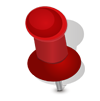
More exhibitor information is being updated,
Please follow the official WeChat of SIAF: SIAF_Guangzhou

Or visit the official website www.spsinchina.com
for “audience pre-registration”.
SIAF2017 will also be held concurrently with the Guangzhou International 3D Exhibition,
Guangzhou International Die Casting and Foundry Exhibition,
and the Guangzhou International Metal Processing Exhibition.
The SIAF Guangzhou International Industrial Automation and Equipment Exhibition is part of the world-renowned SPS IPC Drives electrical automation exhibition series in Nuremberg, Germany.
The exhibits cover various fields of automation, including robots, image technology, sensors, industrial measurement, connection systems, drive and mechanical drive systems, and control technology.
Thematic pavilions also include connection systems pavilion and industrial measurement and sensor technology pavilion.
From March 1 to 3, 2017, meet you at the A Zone of the Canton Fair Complex to share in the industrial event!

SIAF Guangzhou International Industrial Automation Technology and Equipment Exhibition and Smart Industry Solution Shanghai
are currently actively recruiting exhibitors,
For any inquiries regarding the SPS IPC Drives series exhibitions,
please contact the organizer – Guangzhou Guangya Frankfurt Exhibition Co., Ltd.,
Phone: 020-38251558
Email:[email protected]

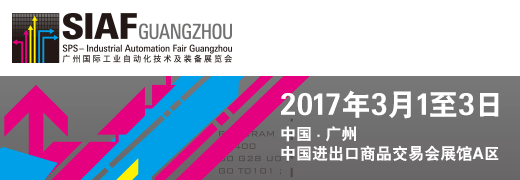
The SIAF Guangzhou International Industrial Automation Technology and Equipment Exhibition is part of the world-renowned SPS IPC Drives electrical automation exhibition series in Nuremberg, Germany. The exhibition covers a comprehensive range of industrial automation fields, providing exhibitors and buyers with an unparalleled opportunity for communication and unlimited business opportunities.
Thematic Zones:
– Robot and Machine Vision Pavilion
– Connection Systems Zone
– Sensor and Measurement Technology Zone
– Electrical Systems Zone
For exhibition pre-registration, please click “Read the original text”